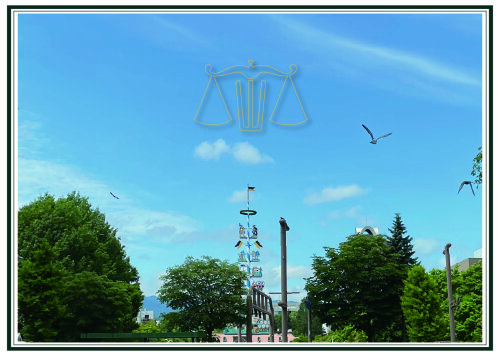Best Wage & Hour Lawyers in Sapporo
Share your needs with us, get contacted by law firms.
Free. Takes 2 min.
List of the best lawyers in Sapporo, Japan
About Wage & Hour Law in Sapporo, Japan
Wage and Hour law in Sapporo, as in the rest of Japan, is governed by national legislation, primarily the Labor Standards Act. This law sets forth the minimum standards for wages, work hours, breaks, and other conditions related to employment. Employers in Sapporo are required to comply with these standards to ensure fair treatment of employees. The city follows Japan's national minimum wage, but local variations may apply depending on the specific industry or regional policies. The regulations are designed to protect workers from exploitation and to guarantee fair compensation for their labor.
Why You May Need a Lawyer
There are several situations where individuals in Sapporo may require legal assistance regarding Wage and Hour issues:
- Unpaid wages or unpaid overtime.
- Wrongful deductions from paychecks.
- Disputes over holiday or leave entitlement.
- Dismissals or terminations that potentially violate labor standards based on wage disputes.
- Harassment or discrimination related to wage payments.
- Unlawful changes to employment contracts regarding working hours or wages.
Consulting a lawyer can help individuals understand their rights, evaluate the strength of their claims, and guide them through the legal procedures for recourse.
Local Laws Overview
The key aspects of local laws that are particularly relevant to Wage and Hour issues in Sapporo are dictated by Japan's Labor Standards Act and related regulations. Some pertinent points include:
- Working hours are typically limited to 8 hours a day or 40 hours a week unless an overtime agreement is in place.
- Overtime work must be compensated at a premium rate, usually 125% of the normal wage, and higher rates may apply during holidays or late-night hours.
- The Minimum Wage Act ensures that a minimum regional wage is set annually, and employers must comply with these regional wage standards.
- Employers must provide at least one day off every week.
- Paid annual leave is granted based on length of service, with a minimum of 10 days per year after six months of employment.
- Specific local variations may apply, hence employers and employees in Sapporo must be aware of any prefectural changes or additions.
Frequently Asked Questions
What is the current minimum wage in Sapporo?
The minimum wage in Sapporo, like elsewhere in Japan, is subject to annual review. Employees should verify the current rate from the local labor office or government announcements, as it adjusts based on economic conditions and policy decisions.
Can my employer make me work overtime?
Yes, but only if there is an accepted overtime agreement in place, and the overtime must be compensated significantly above the normal rate. Employees have a right to refuse excessive overtime.
Am I entitled to overtime pay if I work on a holiday?
Yes, employees are entitled to additional pay if required to work on holidays, and this rate is often higher than regular overtime pay.
What steps should I take if my employer is not paying me correctly?
Start by discussing the issue directly with your employer. If unresolved, consider seeking advice from a wage and hour lawyer or contacting the local labor standards office.
Can my employer change my working hours without my consent?
Employers should not change your working hours without agreement, unless specified within a collective labor agreement or under special circumstances permitted by employment law.
What is the procedure for claiming unpaid wages?
Employees can file a claim for unpaid wages with their city's labor standards office. Legal counsel can help guide the process and ensure claims are properly presented.
Are there specific requirements for breaks during the workday?
Yes, after six hours of work, employees must be allowed at least 45 minutes of rest, while breaks must increase to one hour after eight hours worked.
How do I prove my working hours if my employer disputes them?
Keep meticulous records of your own work hours, including any written communications, time sheets, or digital records. Fellow employees can also provide corroboration.
What should I do if I'm being harassed for wage-related issues?
Document the instances of harassment and seek legal advice. Contacting human resources or the labor standards office can be a viable first step to resolve the issue.
Who can I contact if I feel my labor rights are being violated?
Reach out to the local labor standards office or retain a lawyer specializing in wage and hour laws to discuss your situation.
Additional Resources
For further assistance and information, individuals in Sapporo can reach out to the following resources:
- The Sapporo Local Labor Standards Office provides guidance and enforcement of labor laws.
- Japan Legal Support Center (Houterasu) offers hotlines and legal support for various issues, including labor disputes.
- Local Bar Associations can often provide consultations with lawyers specializing in labor disputes.
- Employment and Human Resources centers can provide additional guidance on employment expectations and rights.
Next Steps
If you need legal assistance with Wage & Hour matters in Sapporo, it is wise to:
- Start by gathering all relevant documentation related to your employment, such as pay slips, work logs, contracts, and correspondence.
- Consult with a local lawyer specializing in employment law to understand your rights and determine the strength of your case.
- Consider mediation services through labor offices as they can often provide a platform for resolving disputes outside the courts.
- If necessary, proceed with filing a formal complaint with the Sapporo Labor Standards Office.
- Attend any necessary meetings or hearings and remain compliant with the legal process laid out by your lawyer or the labor office.
Taking these steps can help protect your rights and ensure fair treatment under the wage and hour laws in Sapporo, Japan.
Lawzana helps you find the best lawyers and law firms in Sapporo through a curated and pre-screened list of qualified legal professionals. Our platform offers rankings and detailed profiles of attorneys and law firms, allowing you to compare based on practice areas, including Wage & Hour, experience, and client feedback.
Each profile includes a description of the firm's areas of practice, client reviews, team members and partners, year of establishment, spoken languages, office locations, contact information, social media presence, and any published articles or resources. Most firms on our platform speak English and are experienced in both local and international legal matters.
Get a quote from top-rated law firms in Sapporo, Japan — quickly, securely, and without unnecessary hassle.
Disclaimer:
The information provided on this page is for general informational purposes only and does not constitute legal advice. While we strive to ensure the accuracy and relevance of the content, legal information may change over time, and interpretations of the law can vary. You should always consult with a qualified legal professional for advice specific to your situation.
We disclaim all liability for actions taken or not taken based on the content of this page. If you believe any information is incorrect or outdated, please contact us, and we will review and update it where appropriate.












